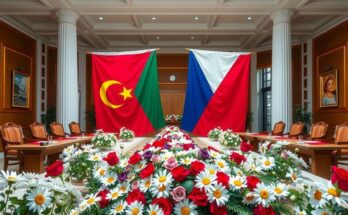MP Rangsiman Rome has urged for immediate reforms to assist Myanmar refugees in Thailand, advocating for their registration to provide legal recognition, access to services, and opportunities for contribution to the economy. He emphasizes the need to address underlying issues such as corruption and the ongoing situation in Myanmar while cooperating with international partners for sustainable solutions.
In light of the escalating humanitarian crisis stemming from Myanmar’s civil war, Thai Member of Parliament (MP) Rangsiman Rome has called for urgent reforms to address the influx of refugees into Thailand. Serving as the chair of the Thai House Committee on National Security and as a deputy leader of the People’s Party, MP Rome emphasizes the necessity of registering these individuals to grant them legal status, which would enable them access to essential services such as education, healthcare, and employment opportunities. In an exclusive interview with VOA, he expressed significant concerns about the current state of refugees who are living without legal recognition and are thus susceptible to exploitation, including corruption. According to him, these registration processes would not only promote compliance with legal standards but also allow for better integration of the refugees into Thai society, enhancing their contributions through taxes and labor. Moreover, MP Rome highlighted the long-term ramifications of the issue, noting that improper management of refugees could exacerbate corruption and might facilitate illegal activities such as drug trafficking and human smuggling, given the porous Thai-Myanmar border. He stated that the government currently lacks clarity in its policies towards the approximately six million Myanmar nationals residing in Thailand. Rome has also called for international cooperation to alleviate the situation, seeking support from allies such as Japan, the United States, and Australia. His recommendations include utilizing foreign humanitarian aid and fostering better internal coordination among Thai ministries to ensure that the refugee crisis can be managed effectively. Critiques have emerged regarding legal loopholes that result in human rights violations impacting migrants. Rome suggests that proper registration and recognition under Thai law are essential for protecting refugees. He further accentuates the importance of addressing the root causes of the influx by bolstering international pressure on the State Administration Council (SAC) in Myanmar to cease its violent practices. Additionally, the MP has criticized the current educational policies, stating that they are inadequate and often discriminatory against refugee children. He advocates for inclusivity within the Thai educational system, arguing that it would benefit the nation as a whole, particularly in light of an aging demographic and declining birth rates. Challenges such as economic strife exacerbated by the pandemic have fueled recent protests against the number of Myanmar refugees in Thailand. Rome emphasizes that these tensions can be alleviated through the registration of refugees, which would allow them to work lawfully and contribute positively to the economy. In conclusion, Rangsiman Rome urges Thai authorities to adopt a cohesive approach to managing the refugee crisis, emphasizing the necessity of cooperation with international partners and improved domestic policies to ensure the rights and well-being of Myanmar migrants in Thailand. His messages highlight a heightened urgency for reform that safeguards human rights while concurrently addressing corruption and potential socio-economic challenges.
The article discusses the ongoing crisis faced by Myanmar refugees in Thailand, which has intensified following a military coup in Myanmar. A significant number of people have fled to Thailand for safety, often living without legal status and exposed to various forms of exploitation. MP Rangsiman Rome articulates the challenges of managing this refugee population, advocating for comprehensive reforms to rectify the situation, including the registration of refugees for better legal protection and access to rights.
Rangsiman Rome’s advocacy for the registration of Myanmar refugees in Thailand underscores the urgent need for reform in addressing migration issues. By recognizing the legal status of refugees, the Thai government could alleviate many ongoing problems related to corruption, human rights abuses, and social tensions. Coordinated efforts at both national and international levels will be crucial to effectively manage the crisis and support the well-being of those displaced by conflict in Myanmar.
Original Source: www.voanews.com




